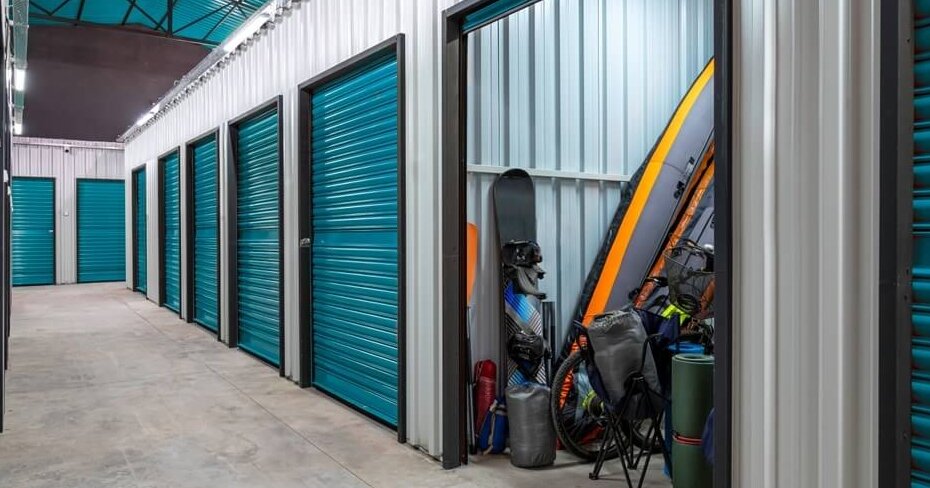How insurance works for self-storage units
By: John Loeppky on January 16, 2024
Picture this: You’re moving south of the border to start an exciting, new job. But while you figure out the logistics of your move, and what you may or may not need in your new home, what about your belongings?
Most people consider self-storage options when they relocate or renovate. They’ll think long and hard about how safe the location is, what happens if their items are damaged, and if it will be covered by insurance. Afterall, the contents may be expensive or valuable.
Let’s take a closer look at how your belongings are insured, and to what extent, in a storage facility.
Your home insurance may provide some coverage
As a homeowner or tenant looking to move your belongings into a self-storage unit, your first step should be to check your existing insurance policy. Standard home insurance policies offer some coverage for stored belongings in a self-storage facility.
Similarly, if you’re a renter, self-storage units in privately-owned facilities may be covered by tenant insurance.
Related: Tenant insurance safeguards your stuff – and your peace of mind
The caveat is that insurers offer limited coverage for items in self-storage – some cover 10% of your belongings and some, up to and including your entire policy limit. For example, if your personal property limit is $50,000, you may only be covered for $5,000, while your furniture, household items, and collectibles may be worth much more. Be sure to check with your insurance company on how much may be covered on your home insurance policy when your belongings are in a self-storage unit.
Home insurance policies also only cover personal belongings that have been in storage for up to 90 days. If you’re moving or downsizing, you’ll likely need coverage for more than three months, as it may take you some time to find a place and settle down. In this case, you might consider a standalone storage unit insurance policy.
What is storage unit insurance?
Storage unit insurance is insurance for any items and belongings that you store in a privately-owned storage facility. Some insurance facilities offer their own protection plans, acting as an intermediary between you and an insurance company. Others require you to hold separate insurance, similar to how apartment buildings require you to get tenant insurance before letting.
Jim Grant, CEO of Storage Protectors, says it’s important that policy holders go through an insurance broker and be very diligent about what plan they choose. While we often only think about theft as the main peril at play while our belongings are in storage, Grant adds that other perils are also important to consider.
What does storage unit insurance cover?
Storage unit insurance covers damage caused by fire, while natural catastrophes like earthquakes are generally not covered. They also rarely cover perils like damage from war or pests. They also rarely cover perils like damage from war or pests. What perils may be covered differs from one insurer to another.
Generally, you should speak with your insurance company about what their policy covers and to confirm whether you should take out any additional coverage beyond the standard agreement. One example of a scenario where you may want additional coverage are items that are generally excluded from your regular storage unit policy, such as expensive jewellery or collectibles.
“The main thing to consider is the amount of coverage to be sure all your items are covered,” Grant says. “You shouldn’t buy the cheapest policy.”
Should you opt for a separate storage unit insurance policy?
As previously mentioned, whether you should opt for a separate policy for your stored goods all depends on what you’re storing and how long you intend on keeping them stored. If the value of your belongings exceeds the coverage you’re offered, or you need to use self-storage for more than three months, a separate storage unit insurance policy will serve you well.
Grant says that one key advantage of opting for a separate storage unit insurance (that is, a policy that is independent of your existing tenant, home, or condo insurance), is that it can save you money in the long term by reducing the impact of any claims can make on your home insurance policy.
Your standard home or tenant insurance provides some amount of coverage for your self-storage unit. In other words, they are tied together, and if you have a lot of claims, your home insurance premiums will go up.
Let’s say you’re using your home insurance policy to protect your belongings, and one day, you need to make a claim against it. Your overall home insurance policy will go up in price, instead of just your premiums for the storage unit policy (which would be the case if you opted for a separate policy).
Read more: How do home insurance claims affect your rates?
Similarly, if your tenant insurance policy covers your belongings in an associated storage locker within your condo building, it is still to your advantage to check in with your condo building management about how their own insurance impacts your liability.
It also never hurts to shop around and compare policies offered by different insurance companies. Adding to Grant’s advice, you should consider the amount of coverage they’re offering and your requirements.
How to protect your belongings while they are in storage
The best way to save some money when considering extra storage space is to check your home insurance policy. If you have any questions about what is covered, and for how long, be sure to speak with an insurance professional.
If you do decide to opt for a self-storage unit, make sure the storage facility is operating in the safest way possible. This means ensuring that they are keeping a log of visitors who are coming in and out, that their building is in good condition, that there are professional-grade security cameras, and that provide immediate responses to your questions and concerns.
Lastly, be sure to do your due diligence – make sure your belongings are packed and protected against any avoidable perils, like rodents or pests.
Read next: What is an Act of God?
Save 20% on average on home insurance
Compare quotes from 50+ Canadian providers in 3 minutes.


432e.jpg)